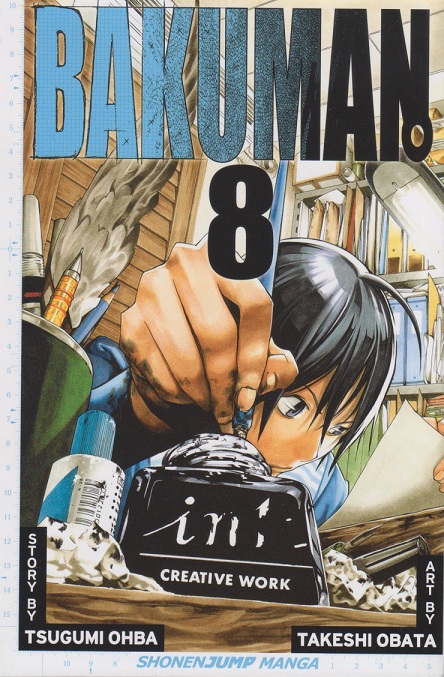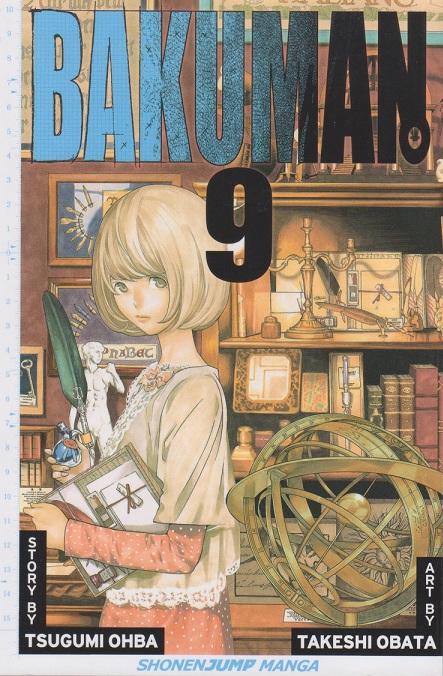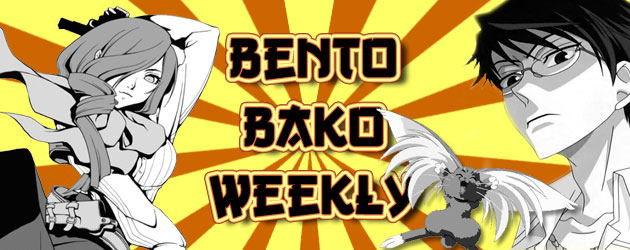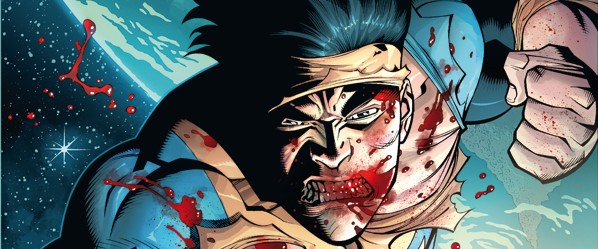 Title: Bakuman
Title: Bakuman
Author: Tsugumi Ohba, with art by Takeshi Obata
Publisher: Viz Media (Shonen Jump)
Volume: Volumes 7-9 (ongoing), $9.99 each
Vintage: March, April, and August 2010 by Shueisha; October and December 2011, and February 7, 2012 by Viz Media
Genre: Slice-of-life, comedy
I’m reviewing three today, so I’ll try to make my summaries briefer than usual. Akito Takagi and Moritaka Mashiro have had their first series in Jump magazine at the age of 17. Detective Trap started out very strong, but lately it’s been falling in the rankings, and their editor, Goro Miura, gets the news that the series will be canceled, along with Ko Aoki and Takuro Nakai’s Hideout Door. Aoki immediately decides to return to her shojo roots, which means she’ll likely leave Jump, but editor Masakazu Yamahisa decides to bring her back to Jump his own way. Feeling deflated, Takagi and Mashiro decide to go to college after all, and begin studying to get into a university together. They don’t let the news get them totally down, though, and immediately start coming up with ideas for a new series. Mashiro wants to test the waters with a one-shot, but Miura insists they go for a series, and a gag manga at that. Frustrated with the direction Miura is leading them in, especially after a conversation with Takahama who is upset with Miura’s push for more comedy as well, so the boys decide to prove their point by offering to do storyboards for two new series, one a gag series and one a serious series. However, when they learn that Eiji Nizuma is going to be a guest judge for the upcoming Treasure Rookie Award, they decide to enter a one-shot behind Miura’s back to prove their point. Their one-shot dominates all the other entries, but due to the circumstances, the winner is an antisocial shut-in named Ryu Shizuka, whom Yamahisa decides to take on. The final decision for Takagi and Mashiro is left up to the readers, as both their comedy Ten and their one-shot Future Watch are tested in the magazine. In the end, Miura manages to convince the duo that a comedy is the way to go, and they decide on a series called Tanto about a boy whose grandfather makes flawed inventions. Meanwhile, Takahama finds his series BB Kenichi falling in the ranks, Nakai shifts his romantic eye from Ko Aoki to fellow assistant Kato (after being rejected by Aoki), and Yamahisa pressures Aoki into creating a romance series for boys, complete with panty shots. Failing to understand a boy’s point of view, Aoki seeks help from Takagi, and Takagi decides to seek help from Aoki on writing his female characters. Unfortunately, Takagi’s ex-girlfriend, Aiko Iwase goes to the same school as Aoki, and the two bump into each other. Iwase uses Aoki to meet with Takagi, starting a massive whirlwind of relationship drama. Kaya Miyoshi, Takagi’s girlfriend, becomes suspicious, and when she finds a sort of love letter hidden inside a copy of Iwase’s new book that she gave to Takagi, she flips out and runs away, staying with Miho Azuki. Miho, thinking that Mashiro must have been in on it, gets upset that Mashiro won’t tell her what’s going on, putting their relationship on thin ice as well. Things take a turn for the worse when Aoki’s new series, Time of Greenery, debuts, and the story is eerily similar to Takagi’s and Mashiro’s relationships. When Takagi realizes that Mashiro’s troubles with Miho are affecting his work, he decides to give in and tell everything to Kaya, which somehow turns into a marriage proposal. With everything smoothed over, the boys get back to work. As Takagi and Mashiro struggle with a comedy series they’re clearly not suited for, editors Hattori and and Yujiro begin to worry about them. Aoki isn’t doing well either, as her panty shots just aren’t cutting it. Takagi and Kaya agree to introduce her to their high school classmate and current manga creator Ishizawa for help, but the meeting is disastrous and offensive. Fukuda, frustrated that one of his friends is in trouble, and fed up with Nakai’s attitude, volunteers himself to help Aoki, and a formidable partnership is born. Meanwhile, a new opponent appears when Iwase decides that in order to compete with  Takagi, she’ll have to create manga as well. Seeing a prime opportunity to get Mashiro and Takagi back on track and creating their best work again, Hattori joins forces with Yujiro, and they manage to get Nizumi to draw Iwase’s scripts. As BB Kenichi gets canceled, both Time of Greenery and Tanto get green lit for series. With Nizuma’s backing, Iwase’s +Natural also becomes a new series. With the pressure on, Takagi does his best with Tanto, but it quickly becomes clear that he can’t keep up with the gags, and the series begins to struggle. While +Natural dominates on the stands, Tanto starts falling behind. It becomes relatively steady, and the editorial department wants to keep it because it captures young readers. However, as the gap between them and Nizuma grows, Takagi loses his ambition and gets stuck in a rut that is endangering his health. Seeing his friend and partner struggling so hard but with his quality still falling, Mashiro decides he’s had enough and makes his feelings known. To him, it’s obvious they’ll never be able to compete with Nizuma with Tanto, so he makes an unheard of decision – quit working on Tanto and do something else entirely. Miura is appalled, but he humors the pair and takes their suggestion to the deputy editor in chief. He rejects them outright, so Mashiro marches straight over to the EIC’s desk and asks to quit Tanto. With the prospect of being kicked out of Jump forever, Mashiro and Takagi stick to their convictions, but end up making a near impossible promise. With their passion back, Takagi and Mashiro are fired up again, and Nizumi is thrilled that his rivals are back in business. Things are looking up for the pair, but Yamahisa has been carefully molding Shizuka into someone who can be worked with, and he’s almost ready to launch his secret weapon.
Takagi, she’ll have to create manga as well. Seeing a prime opportunity to get Mashiro and Takagi back on track and creating their best work again, Hattori joins forces with Yujiro, and they manage to get Nizumi to draw Iwase’s scripts. As BB Kenichi gets canceled, both Time of Greenery and Tanto get green lit for series. With Nizuma’s backing, Iwase’s +Natural also becomes a new series. With the pressure on, Takagi does his best with Tanto, but it quickly becomes clear that he can’t keep up with the gags, and the series begins to struggle. While +Natural dominates on the stands, Tanto starts falling behind. It becomes relatively steady, and the editorial department wants to keep it because it captures young readers. However, as the gap between them and Nizuma grows, Takagi loses his ambition and gets stuck in a rut that is endangering his health. Seeing his friend and partner struggling so hard but with his quality still falling, Mashiro decides he’s had enough and makes his feelings known. To him, it’s obvious they’ll never be able to compete with Nizuma with Tanto, so he makes an unheard of decision – quit working on Tanto and do something else entirely. Miura is appalled, but he humors the pair and takes their suggestion to the deputy editor in chief. He rejects them outright, so Mashiro marches straight over to the EIC’s desk and asks to quit Tanto. With the prospect of being kicked out of Jump forever, Mashiro and Takagi stick to their convictions, but end up making a near impossible promise. With their passion back, Takagi and Mashiro are fired up again, and Nizumi is thrilled that his rivals are back in business. Things are looking up for the pair, but Yamahisa has been carefully molding Shizuka into someone who can be worked with, and he’s almost ready to launch his secret weapon.
I’ve been largely disappointed by, confused over, and bored with Bakuman, but I found myself more engaged this time around. Although that may be because I read three of them all together, which let me look at the series more on the whole, instead of reading single volumes in between thirty other books or whatever. I definitely enjoyed it more all together like this. Still, what really interests me is the editorial department. To be perfectly honest, I find Mashiro and Takagi kind of boring, and I’m not really interested in their success or failure. What I am interested in is the rivalry in the editing department. Watching all the editors stress over their creators, turn in chapters and wait on the edge of their seats for a yay or nay, compete against each other for running series, balance the creators they’re in charge of…all of that is really interesting, and feels like the meat of the story to me. I’ve grown bored of Mashiro and Miho’s side-by-side journey toward success. Takagi and Miyoshi don’t move forward at all until the end of volume 8. So as far as the romance stuff, it has stalled for me. It starts getting spiced up in volume 8, as Takagi and Aoki begin working together more, and Miyoshi becomes suspicious when Takagi’s old girlfriend makes an appearance. Then Miho gets upset that Mashiro has been keeping secrets from her. I’d love to say the sexism gets cut back here, but…I realized that rather than having these girls stand strong, they’re really just going through a very stereotypical paranoia, and they look like naive idiots the way they jump so quickly to conclusions without waiting for any sort of explanation, and don’t trust the guys who’ve never given them a reason not to trust them. That sort of crap always annoys me, and this series has already been plagued with some strange sexism that I’ve never been able to figure out (as in, I still don’t understand if it’s meant to be taken seriously or not). Surprisingly, what bothers me about poor Aoki having to draw panty shots to make her series popular isn’t the panty shots themselves, but rather that she’s being forced to do this by her editor…and that it works. The idea that a creator has to cater to such low brow fan service in order to be successful is really disheartening, though it’s not like I didn’t know it happens. It’s just too bad her editor, Yamahisa, is so sleazy about it. So is Ishizawa; I felt so bad for Aoki having to sit through his perverse idea of helping her, and was glad when Takagi put a stop to it. Though I was more glad when Fukuda stepped in.
 Right now, Fukuda is becoming my favorite of the manga creators in the story. His attitude is rather warped, but he’s fun, kind, passionate, loyal, and reckless in an entertaining way. Aoki’s growing on me a bit, too, as she’s starting to come out of her shell thanks to Takagi and the others. Still, the editors remain my main interest currently. Even Miura, who I didn’t really like at first, is growing on me. He starts out obsessed with his own position and getting a series so that he looks good, but eventually he begins to really care about Mashiro and Takagi’s success and works hard for them and not just himself. It’s unfortunate that at the same time I feel he’s neglecting Takahama in favor of his new dynamite pair, but he’s also really putting himself on the line for them and believes in them. Though, again, where’s his belief in Takahama? Hattori is still up to his old tricks, pitting Nizuma against Mashiro and Takagi from any angle he can find, pushing them both to make the best manga possible. I’m a little worried that in the real world these poor kids would burn out under all the pressure. It’s great that Hattori has faith in them and faith in the magazine, but they’re still young, and he’s really pushing them. I’m starting to feel like the publisher doesn’t see their creators as human beings, but as something to make them money for a while that they can throw out later and replace with something new. The entire process gives me that feeling. Manga publishing is a really harsh world, it seems. Everyone’s constantly working toward getting a new series, but for a new series to run, another series has to be canceled. Someone’s always going to lose. I’m kind of surprised at how this is all represented. So many stories get pitched at once, and so few of them are chosen. It seems largely inefficient to have editors and creators working in this manner, but the process appears to work. The editors are passionate, but there’s a fine balance between being concerned about their own careers, or genuinely interested in the stories they’re working on/creators they’re working with. Miura, as I mentioned, goes through a transition concerning just that. He starts out being happy about just having a solid series running, but eventually decides that Takagi and Mashiro can do a lot better and decides to support them. Yamahisa I can’t pin down; he puts an awful lot of work into molding Shizuka into someone he can actually work with. I’m not sure if he really has faith in Shizuka’s talent or what, and I worry if his actions are doing more harm than good. It’s true that a brutal awakening can have the biggest effect on people like that, but it could so easily back fire, and if he’s not attentive he could end up destroying Shizuka’s life. He knows just how to manipulate Shizuka into getting the response he wants, much like Hattori knows how to light a fire under Takagi and Mashiro. It’s interesting that what ends up driving Takagi to the brink is working on a series he doesn’t really want to, rather than working to surpass his “rivals” with a good series, so maybe Hattori knows best.
Right now, Fukuda is becoming my favorite of the manga creators in the story. His attitude is rather warped, but he’s fun, kind, passionate, loyal, and reckless in an entertaining way. Aoki’s growing on me a bit, too, as she’s starting to come out of her shell thanks to Takagi and the others. Still, the editors remain my main interest currently. Even Miura, who I didn’t really like at first, is growing on me. He starts out obsessed with his own position and getting a series so that he looks good, but eventually he begins to really care about Mashiro and Takagi’s success and works hard for them and not just himself. It’s unfortunate that at the same time I feel he’s neglecting Takahama in favor of his new dynamite pair, but he’s also really putting himself on the line for them and believes in them. Though, again, where’s his belief in Takahama? Hattori is still up to his old tricks, pitting Nizuma against Mashiro and Takagi from any angle he can find, pushing them both to make the best manga possible. I’m a little worried that in the real world these poor kids would burn out under all the pressure. It’s great that Hattori has faith in them and faith in the magazine, but they’re still young, and he’s really pushing them. I’m starting to feel like the publisher doesn’t see their creators as human beings, but as something to make them money for a while that they can throw out later and replace with something new. The entire process gives me that feeling. Manga publishing is a really harsh world, it seems. Everyone’s constantly working toward getting a new series, but for a new series to run, another series has to be canceled. Someone’s always going to lose. I’m kind of surprised at how this is all represented. So many stories get pitched at once, and so few of them are chosen. It seems largely inefficient to have editors and creators working in this manner, but the process appears to work. The editors are passionate, but there’s a fine balance between being concerned about their own careers, or genuinely interested in the stories they’re working on/creators they’re working with. Miura, as I mentioned, goes through a transition concerning just that. He starts out being happy about just having a solid series running, but eventually decides that Takagi and Mashiro can do a lot better and decides to support them. Yamahisa I can’t pin down; he puts an awful lot of work into molding Shizuka into someone he can actually work with. I’m not sure if he really has faith in Shizuka’s talent or what, and I worry if his actions are doing more harm than good. It’s true that a brutal awakening can have the biggest effect on people like that, but it could so easily back fire, and if he’s not attentive he could end up destroying Shizuka’s life. He knows just how to manipulate Shizuka into getting the response he wants, much like Hattori knows how to light a fire under Takagi and Mashiro. It’s interesting that what ends up driving Takagi to the brink is working on a series he doesn’t really want to, rather than working to surpass his “rivals” with a good series, so maybe Hattori knows best.
Bakuman doesn’t always paint the manga industry in the best light, but it’s an interesting glimpse into how the system works. I wonder how much of the process is exaggerated (aside from what the creators are doing, because artists like Nizuma just don’t exist), and how much is an accurate representation. It’s certainly gotten more interesting as a series as it’s gone on, and I wouldn’t mind recommending it now despite its flaws. Given the choice, though, well, there are other series I’d rather read. It’s entertaining enough, but given my apathy toward the main characters, and how long it takes to get through the incredible amount of dialog, I could pass on it without feeling I’m missing out.
Kris
kristin@comicattack.net
@girlg33k_kris
Review copies provided by Viz Media.


